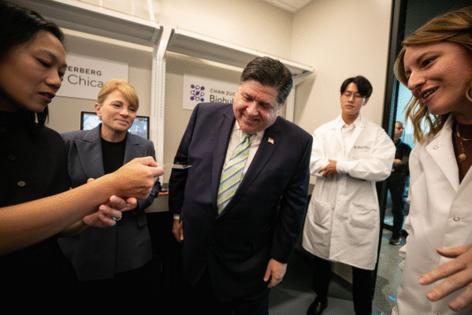Chicago biohub backed by Mark Zuckerberg publishes its first research, discovering way to continuously monitor inflammation
Published in Home and Consumer News
A Chicago biomedical research hub backed by Facebook creator Mark Zuckerberg and his wife, Dr. Priscilla Chan, has produced its first published research — on discovering a way to monitor inflammation in real time using sensors implanted under the skin.
The study, co-led by Northwestern University researchers at the Chan Zuckerberg Biohub Chicago, was published this week in the peer-reviewed journal Science.
The sensors were implanted in diabetic rats to track changes in certain proteins that can indicate inflammation. While it’s already possible to measure changes in the proteins through periodic blood or urine tests, the sensors could provide a way for doctors and scientists to continuously measure the changes as they occur.
“We hope that this is work that provides a foundation for us being able to track inflammation in the human body, which is important to do because many, many diseases really start as inflammation, where you have damaged tissue caused by the immune system,” said Shana Kelley, a senior author of the paper, president of the Chan Zuckerberg Biohub Chicago and a professor of chemistry and engineering at Northwestern.
More than half of all deaths in the world are caused by inflammation-related diseases such as heart disease, stroke, cancer, diabetes and chronic kidney disease, according to research. Inflammation is the body’s response to illness or injury and can help the body heal. But inflammation can also be harmful if it goes on for too long or occurs when there’s no danger, according to the Cleveland Clinic.
“If we could see inflammation kind of rising in the human body, we could intervene at a much earlier point and then hopefully the disease does not become as advanced, or, one day we prevent it all together,” Kelley said.
She said the idea to use a sensor to monitor inflammation in real time was inspired by continuous glucose monitors, which are sensors people with diabetes often affix to their arms or stomachs to continuously monitor their glucose levels.
This first published research comes less than two years after the Chan Zuckerberg Initiative announced plans to establish the biohub in Chicago. The Chan Zuckerberg Initiative has committed $250 million over 10 years to fund the project. Gov. JB Pritzker has also committed $25 million in state dollars to support it.
Scientists from Northwestern University, the University of Chicago and the University of Illinois Urbana-Champaign work together at the biohub, located in Fulton Market. The three Illinois universities beat out proposals from about 60 other teams across the country to win the funding. The Chicago biohub will continue to focus its research on inflammation, Kelley said.
The Chicago biohub is one of four institutes across the country in the Chan Zuckerberg Biohub Network.
©2024 Chicago Tribune. Visit at chicagotribune.com. Distributed by Tribune Content Agency, LLC.








Comments